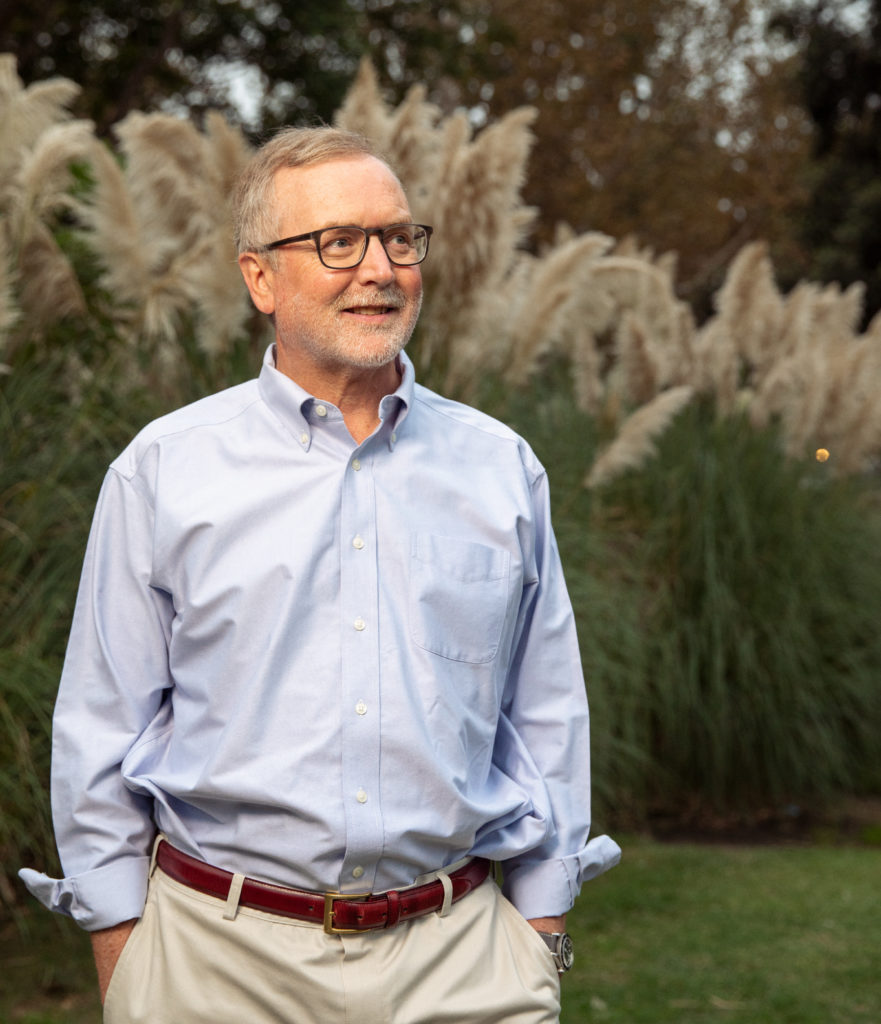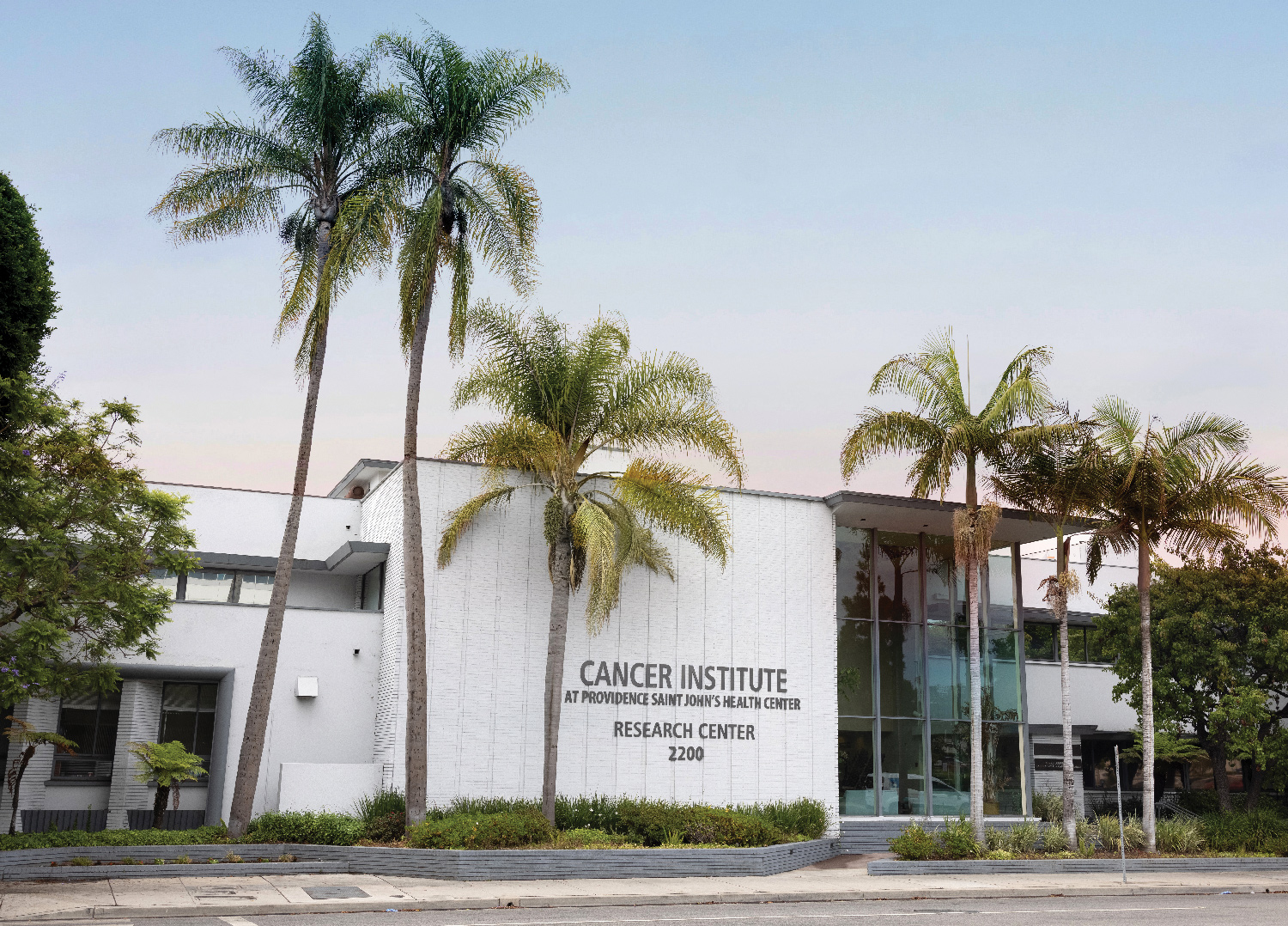In the spring of 2020, Leland Smith, then 56 and a corporate lawyer, began having trouble urinating. He felt the urge but it was hard to empty his bladder. So he saw a Westside urologist who ran tests and gave him medications that seemed to help. Then in October of that year, Smith had an extensive physical exam, which showed some kidney function impairment.
His primary care physician, Jill Wei, MD, a member of the Saint John’s Physician Partners network, was concerned and quickly ordered an ultrasound of his kidneys and bladder. When the results revealed a large mass on his bladder, Dr. Wei referred him to Jennifer Linehan, MD, a urologist who is part of the Urology and Urologic Oncology Center of Excellence at the Saint John’s Cancer Institute.
Shortly after the ultrasound and surgery using a camera into the bladder to remove the tumor, Smith learned his life could be in jeopardy. “The biopsy showed the tumor was a high-grade bladder cancer that had invaded deep into the bladder muscle, which is typically seen in patients in their mid-70s,” she says. “The gold standard for treating this is chemotherapy and then bladder removal because of the high risk of the cancer spreading to other organs and a poor life expectancy.”
For Smith, the diagnosis led to “perhaps the darkest moment of my treatment—telling my wife and four sons that I had cancer.”It was also the beginning of a complicated process to achieve the best possible health outcome through the skill, compassion and commitment of Saint John’s Cancer Institute staff.The institute’s Urology and Urologic Oncology Center of Excellence specializes in the treatment of bladder, kidney, testicular and prostate cancer.
Utilizing a multidisciplinary, team-based approach, the center provides patients with personalized care that is rooted in skill, experience and compassion. Urologic oncology specialists offer minimally invasive treatment techniques and innovations, including robot-assisted surgery to remove the bladder and create a new bladder out of the small bowel.
“I feel fortunate to have ended up under the care of really good doctors who were straightforward, experienced, willing to answer all my questions and worked together very effectively,” says Smith.

An Arduous Journey
In late November 2020, Smith began what was planned to be four chemotherapy cycles, managed by Przemyslaw Twardowski MD, a medical oncologist and director of clinical research, urology and urologic oncology at Saint John’s Cancer Institute. He only underwent three cycles because “his kidneys weren’t filtering his blood efficiently possibly due to the chemotherapy,” says Dr. Linehan, “and if patients are having side effects, sometimes we’ll cut the chemotherapy cycles short.”
Smith says the chemo made him very tired, but he has kudos for the health center staff who cared for him during the treatment and during COVID-19 when family visits weren’t allowed. “The nurses in the infusion room were amazing, particularly since I was completely reliant on their help and care. Some of my infusion days lasted for over eight hours,” he says. “They were as kind as they could be to me and the other patients there.”
After three months of chemo, in February 2021, Smith underwent bladder, prostate and lymph node removal followed by bladder reconstruction surgeries. Timothy Wilson, MD, professor and chair of urology and urologic oncology, led the team that removed his bladder and Dr. Linehan then created a new one using a portion of his small intestine or bowel, a procedure called neobladder construction.
During the three weeks Smith was in the hospital recovering from the surgeries, he experienced multiple side effects that are typical following this type of surgery: weight loss, infections and a hernia. “The first three months after these procedures tend to be the hardest—getting used to the new bladder, urine infections and electrolyte abnormalities,” Dr. Linehan says. “Patients have been glad that I gave them a heads-up about this—half of the fear is not knowing what to expect.”
One typical side effect is the urinary infection that went into Smith’s bloodstream. “Patients are immunocompromised by chemotherapy and because the digestive system is opened up during surgery to create the new bladder it can expose bacteria,” Dr. Linehan says. “In this case, it was manageable because we caught it early.” Complications can also arise, she explains, because “you’re taking away the bladder, how the body stores and empties urine and replacing it with bowel, an organ that has been doing a totally different job—absorbing and storing nutrients.”
The challenges Smith faced weren’t over, however. In March 2021, he had emergency colon surgery performed by Dr. Linehan and Anton Bilchik, MD, PhD, professor of surgery and chief of medicine at the Saint John’s Cancer Institute, because he had developed scar tissue that caused his bowel to become trapped, and a portion of his intestines had become twisted.
THE POWER TO HEAL
Today, Smith is fully recovered and sees Dr. Linehan for check-ups every three months. He will continue to be monitored for at least 10 years. “He’s doing excellent,” Dr. Linehan says. “There’s no recurrence of cancer. His bladder is functional; he’s exercising, and his kidney function is good.”
“The Saint John’s staff treated me with a lot of concern, kindness and respect and made me feel that I was receiving top-notch care,” says Smith, who is retired and enjoys traveling and spending time with his wife and sons. “They also treated my case with urgency and made themselves available when I needed them.”
Dr. Linehan, whose practice includes treating kidney and prostate cancer, says that physician accessibility before, during and after procedures is one of the strengths of Saint John’s Urology Center. “We got him in for surgery three days after his tumor was found on ultrasound, and when we knew the severity of the issue, we had him into treatment within a week. We also used the latest robotic surgery to remove the bladder and speed his recovery,” she says. “His experience shows the benefits of having a care team that is constantly available, a medical oncologist and two surgeons who are all in same unit, and ongoing follow-up visits. And, when patients have complications or other issues post- surgery, we’re there for them.”
Smith’s treatment also reflects the doctor’s philosophy of patient care. “For cancer patients, it’s having a lot of compassion to treat them as I would my own family members,” says Dr. Linehan, who makes time to provide pro bono urological care to the low-income patients of the Venice Family Clinic. “My cancer patients have direct access to me. It makes it easier to assess problems earlier and get things taken care of.”The urology team is among the nation’s leaders in minimally invasive surgery, including robot-assisted techniques, in the removal and reconstruction of bladders. This surgical approach results in less blood loss, faster recovery time and less pain and need for narcotics. Patients often experience an earlier return to normal activities. In follow-up visits, patients receive innovative blood tests that can provide early detection if the cancer returns and can guide physicians on the best treatment approach.
Dr. Linehan and other Saint John’s physicians also conduct research. She is involved in prostate and kidney studies, including developing urine tests that, for the first time, will be able to detect kidney cancer. The team has also employed new technology like the blue light cystoscopy which can see very small almost microscopic cancers in the bladder and updated PET scans and imaging to detect cancer and check for metastasis.”
Dr. Wilson, Dr. Linehan and Dr. Twardowski offer clinical trials for invasive and noninvasive bladder cancer. They are testing new therapies using chemoradiation with a small ring that goes inside the bladder. They also have focused programs on trimodal therapy to provide bladder- sparing options for those who cannot have or do not want cystectomy. Dr. Twardowksi has focused clinical trials for new systemic therapies for patients who have metastatic bladder cancer. Dr. Wilson has been working on a device that can collect cancer cells from the blood that can be tested and used as a true liquid biopsy.
Philanthropic support has been critical for both treatment and research advances. “It’s allowed us to hire and construct teams of physicians and researchers to deliver better patient care and buy equipment to detect and see very tiny tumors when bladder cancer recurs,” she says. “New technologies are coming out all the time. With the help of donors, we would like to employ those innovations at Saint John’s.”
Pioneering surgical oncology played a role in Smith’s recovery, he notes. “I am now 18 months into recovery. My cancer is in remission, and I have adjusted to the ‘new normal’ of my neobladder. Throughout, I was sustained by family, friends and faith. But I was healed by the urologic oncology team at Saint John’s.”
FOR MORE INFORMATION ON HOW YOU CAN HELP US SAVE LIVES,
CALL 310-829-8424.
TO MAKE AN APPOINTMENT AT
SAINT JOHN’S CANCER INSTITUTE310-315-6125
MORE INFO
